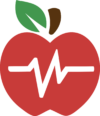If you were playing with words game and your partner said “vitamins,” how would you answer? If the words “pills” and “supplements” instantly spring to mind, you could be missing the major point of the vitamin tale, which is that hundreds of foods contain over a dozen vitamins that are involved in many bodily processes. Quite simply foods supply vitamins to support all that you are and all that you do- and supplements of any one of them, or even a combination of them, that cannot compete with foods in keeping you healthy.
The Vitamins- An overview
The word vitamin is originated from two words “vita” meaning life and “amine” containing nitrogen as the first vitamins contained nitrogen.
Our bodies need a little amount of organic substances called vitamins. Vitamins are organic compounds that our bodies require in small quantities. It plays significant roles in various physiological processes. They are essential for our health because they act as cofactors or coenzymes, assisting enzymes in carrying out vital chemical reactions in our bodies. Without these vitamins, these processes would either slow down or cease altogether. They perform specific functions in various bodily processes that promote growth, reproduction, or the maintenance of health and life.
Classification of vitamins

Vitamins are divided into two main groups
- water-soluble vitamins
- fat-soluble vitamins
Understanding these classifications is very important because they determine how they are absorbed, transported, and stored in the body.
Water soluble vitamins
- B-complex vitamins
- B1 (thiamin)
- B2 (riboflavin)
- B3 (niacin)
- B5 (pantothenic acid)
- B6 (pyridoxine)
- B7 (biotin)
- B9 (folic acid
- B12 (cobalamin)
- Vitamin C (ascorbic acid)
Vitamin B-complex is important for energy metabolism, neurological function, and DNA synthesis.
Vitamin C plays an important role in collagen production, immune function, and wound healing. Its deficiency causes scurvy, a once fatal disease.
Fat-Soluble Vitamins
- Vitamin A (Retinol)
- Vitamin D (Calciferol)
- Vitamin E (Tocopherol)
- Vitamin K (Phylloquinone)
Vitamin A (Retinol): It is important for vision, immune function, and skin health. Vitamin A has two forms
- Preformed vitamin A (retinol) from animal sources
- Plant-derived provitamin A carotenoids
Vitamin D (Calciferol): This vitamin is known as the sunshine vitamin because it supports calcium absorption, bone health, and immune regulation. Lack of sunlight exposure can lead to vitamin D deficiency.
Vitamin E (Tocopherol): Vitamin E is a powerful antioxidant that protects cells from oxidative damage. It also contributes to skin health and immune function.
Vitamin K (Phylloquinone): Crucial for blood clotting and bone metabolism, vitamin K exists in two forms, K1 and K2, each with unique roles.
Function of vitamins
Vitamins are involved in many physiological processes. Their function goes beyond simple nutritional elements and involves complex biochemical processes.
Cell metabolism
Many B-complex vitamins participate in energy production by converting food into usable energy. For example, vitamin B12 is essential for the formation of red blood cells and the maintenance of nerve cells.
Antioxidant defense
Vitamins C and E, along with other antioxidants, neutralize harmful free radicals, reduce the risk of chronic disease, and slow the aging process.
Immune system support
Vitamins A, C, D, and E strengthen the immune system and increase the body’s ability to fight infections and diseases.
Bone health
Vitamin D and vitamin K work together to promote calcium absorption and bone mineralization, reducing the risk of osteoporosis.
Vision and skin health
Vitamin A is essential for maintaining healthy vision, and vitamin E contributes to skin elasticity and protection from UV damage.
Vitamin source
To get the right amount of vitamins, it’s important to know the dietary sources of these essential nutrients.

Natural food sources
| Vitamin | Food Sources |
| Vitamin C | Citrus fruits, strawberries, peppers, broccoli |
| Vitamin B | whole grains, meat, poultry, fish, eggs, dairy products |
| Vitamin A | liver, eggs, dairy products (retinol) Carrots, spinach, and sweet potatoes (carotenoids) |
| Vitamin D | fatty fish (salmon, mackerel), egg yolks, fortified foods |
| Vitamin E | nuts, seeds, vegetable oils, leafy vegetables |
| Vitamin K | Green and yellow vegetables, broccoli, Brussels sprouts |
Note: If you have a vitamin deficiency or special dietary restrictions, you may need vitamin supplements, but they should be taken under medical supervision to prevent overdosing.
Common Deficiencies
Vitamin deficiencies can cause a variety of health problems, ranging from mild to severe. Understanding these effects is important to maintain optimal health. Common defects
| Vitamin | Health Problems |
| Vitamin D | weaker bones, increased risk of fractures, and weakened immune system |
| Vitamin C | (scurvy): Characterized by fatigue, muscle weakness, swollen gums, and slow wound healing |
| Vitamin B12 | anemia, fatigue, and nerve damage |
| Vitamin A | night blindness, dry skin, and weakened immune system |
Prevention and Treatment
To prevent deficiencies, you should pay attention to a balanced and varied diet. Treatment usually includes dietary changes and sometimes nutritional supplements prescribed by your doctor.
Conclusion
Vitamins are not just nutritional supplements but they are essential components of a healthy life. Their diverse classifications, functions, sources, and deficiencies highlight their diverse importance in human health and beyond. As we continue to unravel the secrets of these micronutrients, it is becoming increasingly clear that vitamins are fundamental to our health and deserve special attention from the scientific and medical communities.

